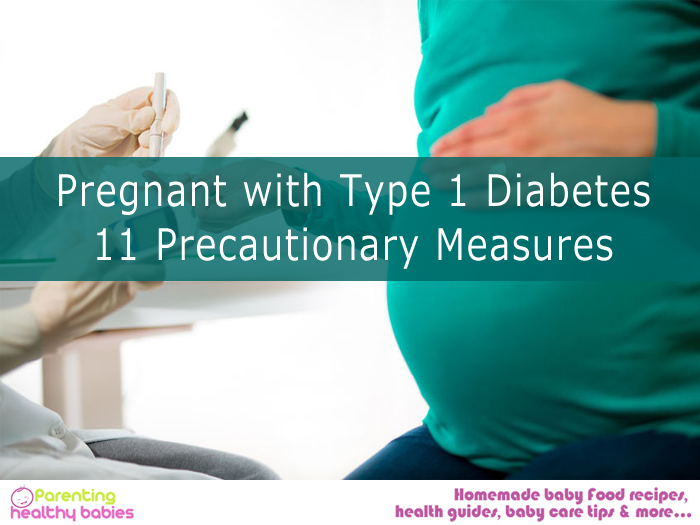Do not fret, if you have type one diabetes and just got to know you are pregnant. With a little care, your pregnancy can be smooth and hassle free. Listed below are a few measures you must take to stay healthy and for your baby to be healthy too.
What wasn’t possible in the past with regards to women pregnant with type 1 diabetes is commonplace today. Put it down to the invention of insulin for diabetics. Today, women can hope to have a safe pregnancy and childbirth, though diabetic. This progress is due to the control of good blood glucose or sugar, which is linked to diet, daily monitoring of blood glucose and periodic insulin shots.
Read More: Home Remedies For Gestational Diabetes During Pregnancy
By taking precautions during pregnancy, women can have a safe and normal delivery. Here are 11 precautions they can take:
11 Precautionary Measures
1. Control blood glucose levels
If there’s glucose in the mother’s blood, it crosses the placenta to endow the baby with energy. Or if, therefore,the mother has high blood glucose levels, the baby can have equally high glucose levels. If blood glucose levels are high, it can lead to miscarriage and birth defects early in pregnancy. As delivery approaches, pregnant women with high blood glucose levels can increase the size and weight of the baby and therefore increase the level of complications at delivery. Childbirth becomes difficult and necessitates a C-section.
Pregnant women with type 1 diabetes should take between two to four insulin injections every day. During the last trimester, pregnant women need more insulin because the body begins to be insulin-resistant as the pregnancy advances.
2. Get yourself a check-up
Before you get pregnant, have a complete check-up. Check for eye disease, high blood pressure, nerve damage, heart and blood vessel disease, thyroid disease, kidney disease, etc. It’s not uncommon to find that pregnant women with type 1 diabetes have health problems. Your health care team can take care of you by adjusting your treatment.
3. Get the best health care from medical experts
Visit your health care team of diabetes and pregnancy experts who will assure you that you and your baby are in safe hands. This team will include a specialist in diabetes care; an obstetrician who regularly treats diabetic women; a diabetes counsellor who can help you take care of your diabetes; a nurse who offers prenatal care during pregnancy; and a registered dietician to offer meal plans. Apart from these, renal experts and social workers are also part of the team.
4. Exercise
Pregnant women with diabetes can manage it by controlling their weight and blood glucose levels. They can exercise at a moderate pace by going for brisk walks. Meditation also helps calm the mind.
By leading a physically active life, pregnant and diabetic women can reach their target blood glucose levels. This can help regularize their levels of blood pressure and cholesterol so that they remain stress-free, have strong hearts and bones and flexible joints. If you were exercising before your pregnancy, keep this up for five days a week. Speak to your health care group about the activities are best for you during your pregnancy.
5. Don’t smoke
It’s a well-known fact that when healthy women smoke during pregnancy, they give birth to stillborn babies or they deliver premature ones. However, pregnant women with type 1 diabetes smoke habitually, it increases their risk for conditions like diseases of the heart, kidneys and eyes and diabetes.
6. Seek the advice of a registered dietician and nutritionist
When you’re still planning your pregnancy, seek the advice of a dietician and continue this afterwards. From your dietician, you can figure out what to eat, how much to eat and when. With the help of the dietician, you can get a meal plan that specifically suits your needs, medical condition, physical activity level, etc. As you go closer to the date of delivery, there may be many times that you meet with the dietician to make changes in the meal plan.
7. Eye examination
Diabetic retinopathy is a condition in which the light-sensitive tissue that lines the retina has leaky and abnormal blood vessels. This can lead to blindness in extreme cases, something that pregnancy can only worsen. During pregnancy, the risk of retinopathy worsening is attributed to women with the highest levels of glycated hemoglobin (A1C) values and in those whose A1C levels fall sharply during pregnancy.Women with type 1 diabetes should have a dilated eye exam by an ophthalmologist before getting pregnant and during the first three months of pregnancy.
8. Kidney function monitoring
For already diabetic and pregnant women, pregnancy does not cause diabetic nephropathy but it can worsen it. At every prenatal visit, you should have your kidney function checked by using a urine dipstick testing for protein.
If you are diagnosed with diabetic nephropathy, it could raise your risk for developing other pregnancy-related complications, such as small sized babies, preeclampsia and preterm delivery. You could have a C-section delivery and give birth to a small baby because of a reduction in blood flow to the placenta. If your nephropathy worsens during pregnancy, you could have high blood pressure which could place an increased stress on the kidneys.
9. Ultrasound
During pregnancy, your doctor could recommend ultrasound for many reasons, such as:
- To establish the due date:During the first 13 weeks of pregnancy, an ultrasound examination of the baby should be done, particularly if there’s a doubt about your date of the last menstrual period. This date is important to base the date of foetal testing and that of the baby’s delivery.
- To screen for birth defects:Between weeks 18 and 20 of pregnancy, an ultrasound exam must be performed to screen for birth defects. The baby’s spine and heart should show up in the exam because babies of diabetic mothers are generally at greater risk for heart and neural tube defects.
10. Screening for birth defects
Women with high blood glucose levels during the early weeks of pregnancy are highly likely to have foetuses with birth defects. Birth defects usually develop by week 10 of pregnancy. Though diabetes in the mother doesn’t cause specific birth defects, yet the commonest defects include those of the heart and neural tube.
According to studies, if pregnant women manage their blood glucose levels significantly before becoming pregnant, they can vastly reduce the risk of birth defects in their babies. Additionally, to lower the risk of neural tube defects, women who are planning a pregnancy should take folic acid supplements and prenatal vitamin two months before conceiving. This should continue till they complete their first trimester.
11. Foetal testing
The foetus should be monitored during the third trimester, between 32 and 34 weeks of pregnancy. This will include non-stress testing sessions. Your doctor will do this by monitoring the baby’s heart rate using a small device placed on your abdomen. With sound waves, this device will measure the foetus’ heart rate for about 20-30 minutes.
Read More: Gestational Diabetes : Signs and Symptoms
Resources:
http://www.health.com/health/gallery/0,,20406169,00.html#get-your-blood-sugar-under-control-0
http://www.prokerala.com/health/pregnancy/care-for-prenatal-diabetes.htm













